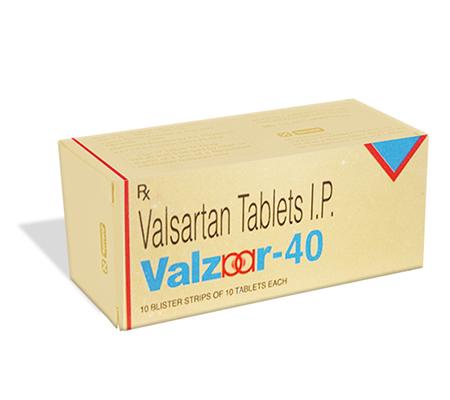Valzaar contains a fixed dose of Valsartan, an angiotensin II receptor blocker, that is used to treat hypertension in people with high blood pressure who are at risk of cardiovascular disease, to prevent stroke and heart attack.
Valzaar is used to treat hypertension, which is high blood pressure when at rest. Although there are usually no other symptoms, high blood pressure increases risk of cardiovascular disease and Valzaar reduce the risk of stroke and heart attack, by lowering blood pressure to normal resting levels which helps the heart to cope better, reducing symptoms of breathlessness on exertion and also increasing life expectancy. Valzaar is also used to treat patients with heart failure and patients who have had a heart attack, to improve survival and prevent further damage to the heart.
You should take your Valzaar with a glass of water, with or without food once a day, at the same time each day. Valzaar will help control your blood pressure but will not cure it, so you should continue to take your Valzaar for as long as your doctor recommends, to keep your blood pressure down to normal levels.
The most commonly reported side effects when using Valzaar include: viral infections and upper respiratory tract infections, like sinusitis or pharyngitis, dizziness, cough, diarrhoea, abdomina; pain, headache, fatigue, back pain, nausea, changes in blood salts.
You should not use Valzaar if you: are allergic to valsartan or any ingredients in Valzaar; are allergic to sulphonamides; are pregnant, planning to become pregnant, or breast-feeding; have liver or kidney disease; are taking medications that interact with Valzaar, including: other antihypertensives, diuretics like furosemide, potassium-sparing diuretics like spironolactone, potassium tablets or potassium-containing salt substitutes, corticosteroids like, prednisone, cimetidine for ulcers, sulfonylurea diabetic medications like glibenclamide, lithium for mood swings, non-steroidal anti-inflammatory drugs.
Several medications interact with Valzaar and should either not be taken while you are taking Valzaar or only after discussion and instruction from your doctor: drugs that increase side effects: other antihypertensives, diuretics like furosemide; Drugs that affect Valzaar: non-steroidal anti-inflammatory drugs cimetidine for ulcers, sulfonylurea diabetic medications like glibenclamide; Drugs that are affected by Valzaar: potassium-sparing diuretics like spironolactone, potassium tablets or potassium-containing salt substitutes, lithium for mood swings
You should keep your Valzaar in their blister packs until use and store below 30°C in a cool dry place.






